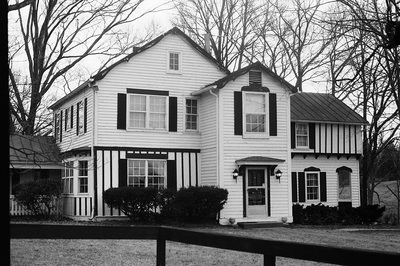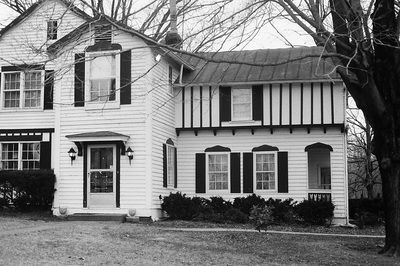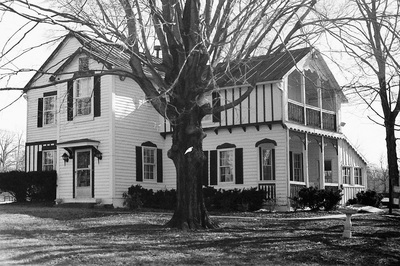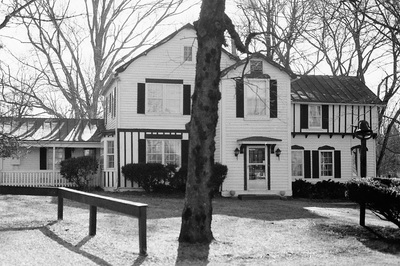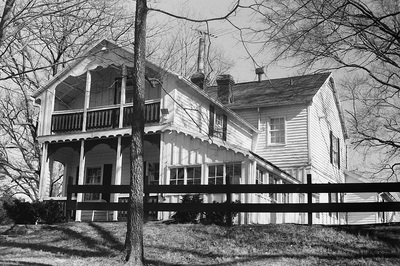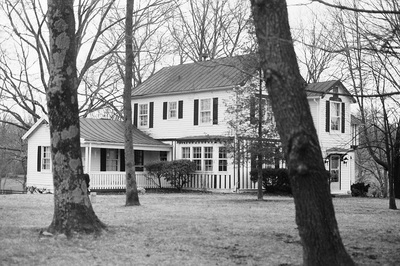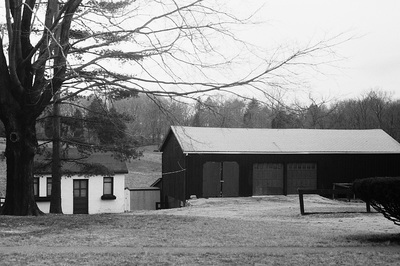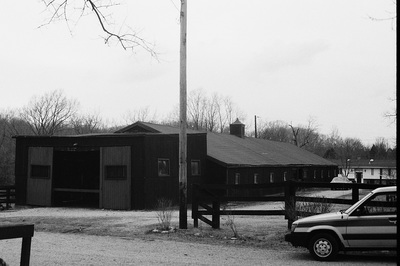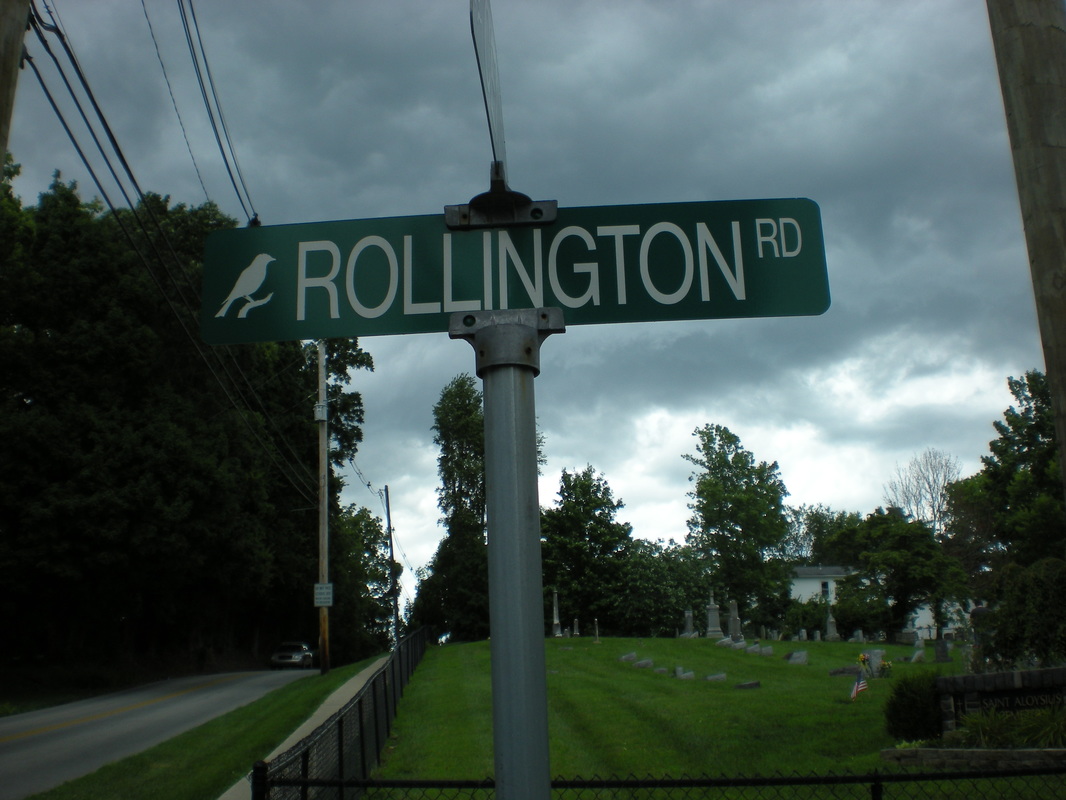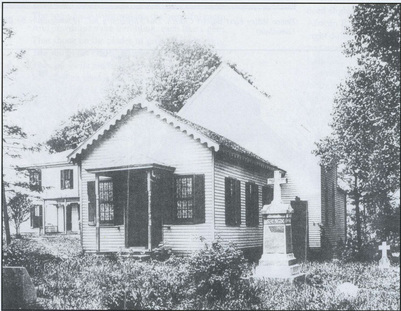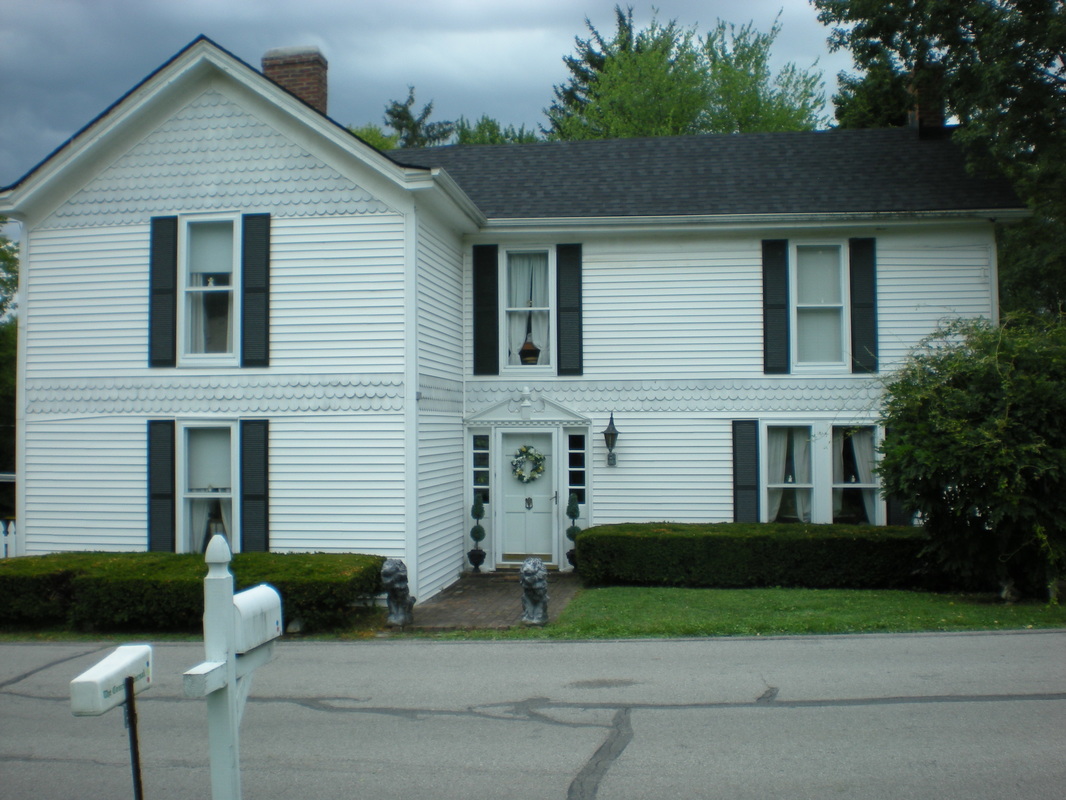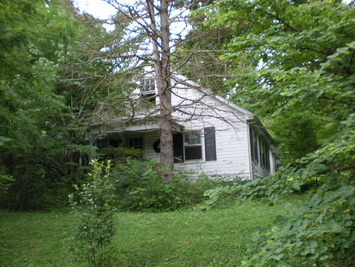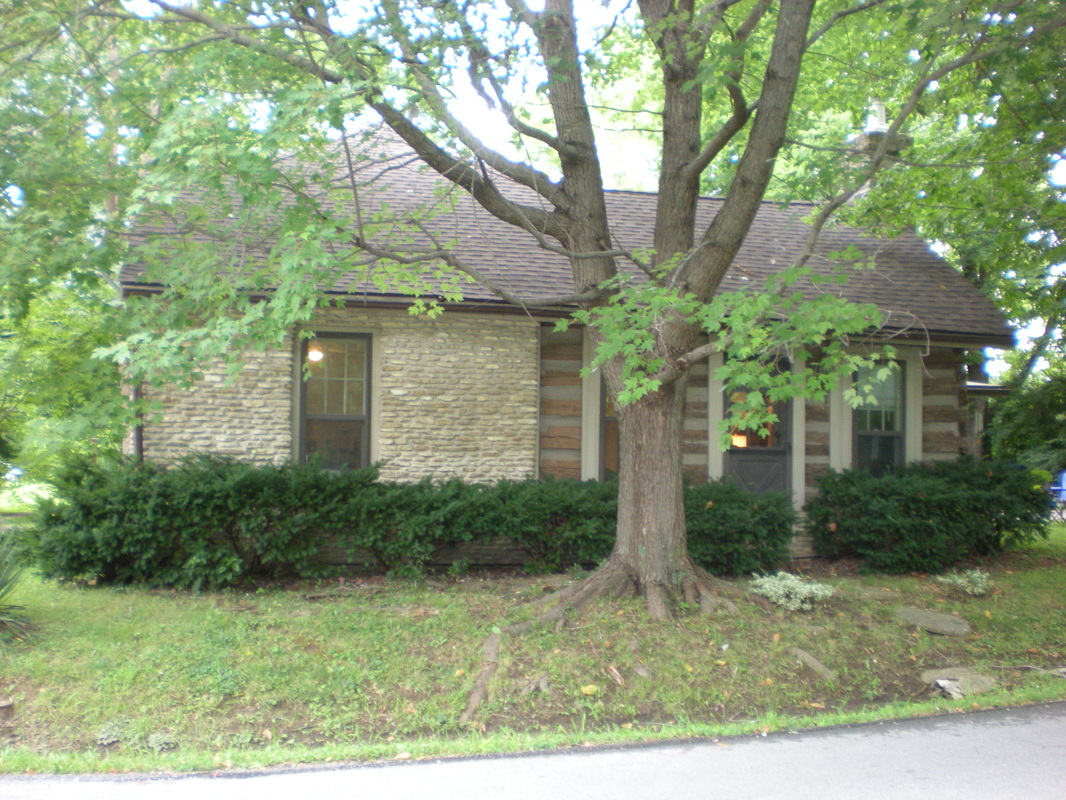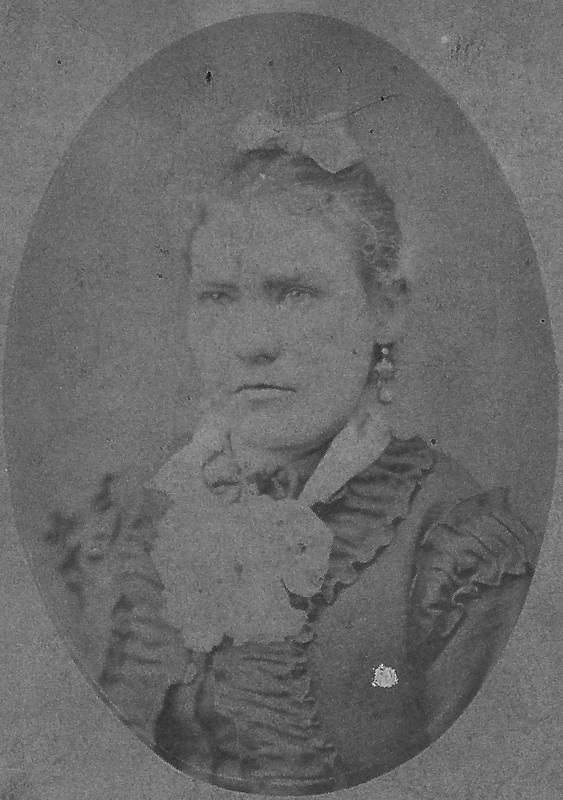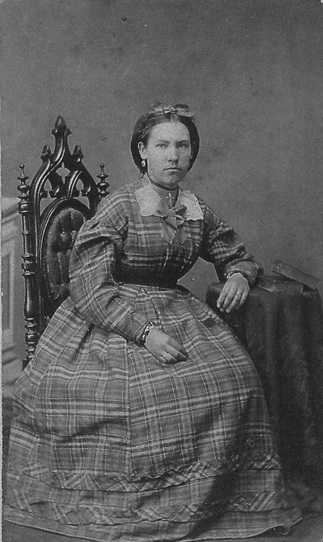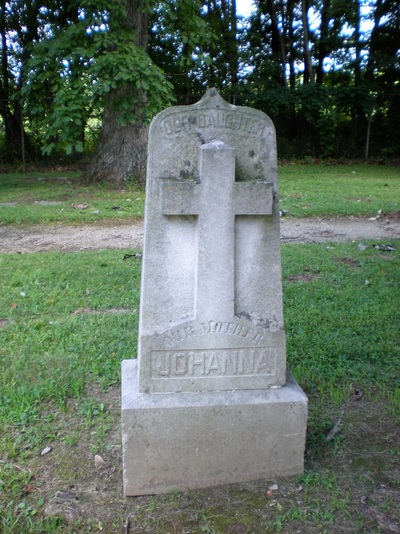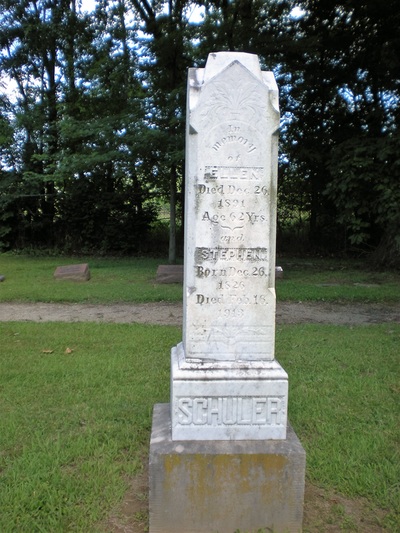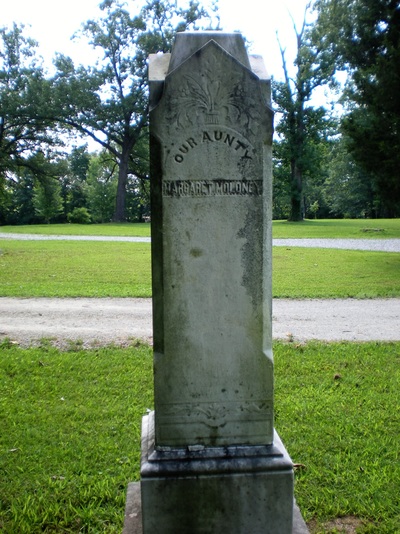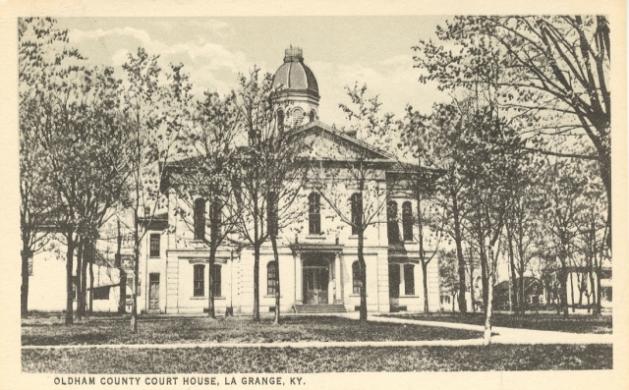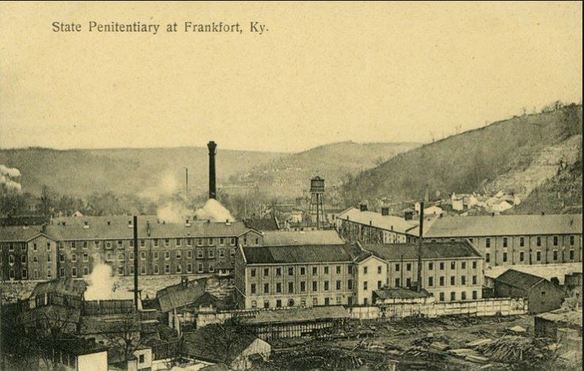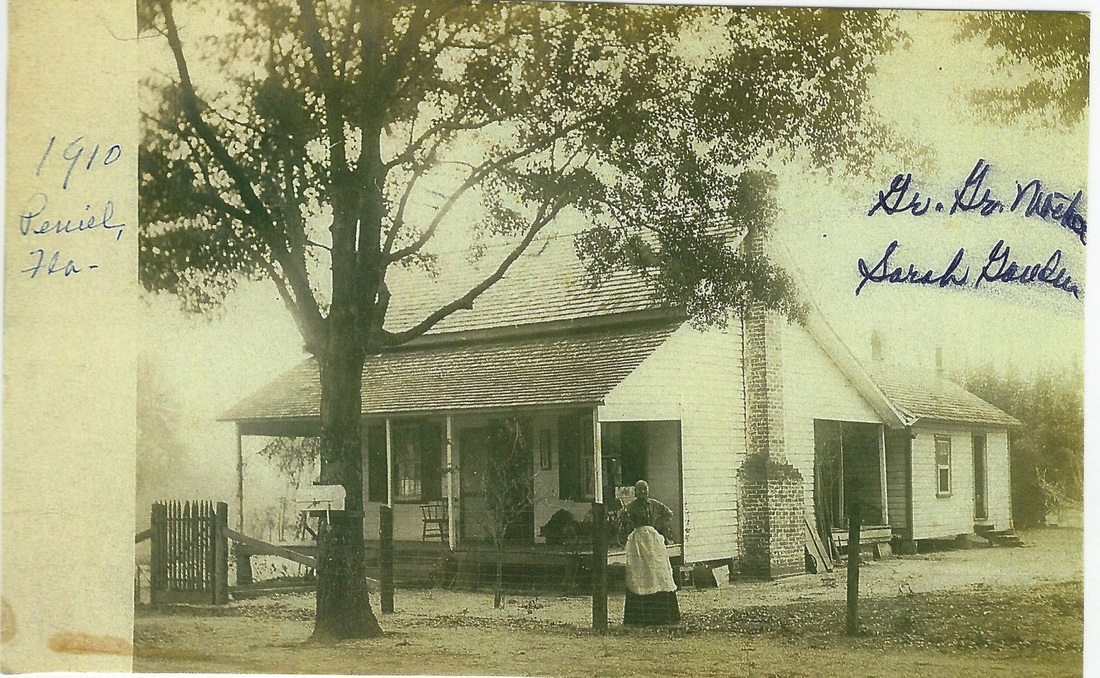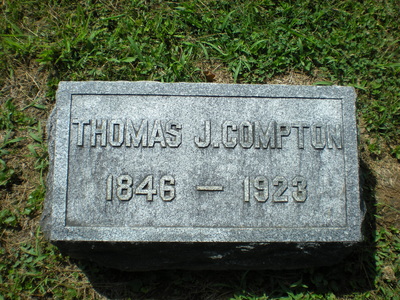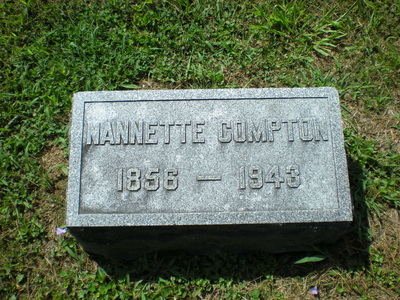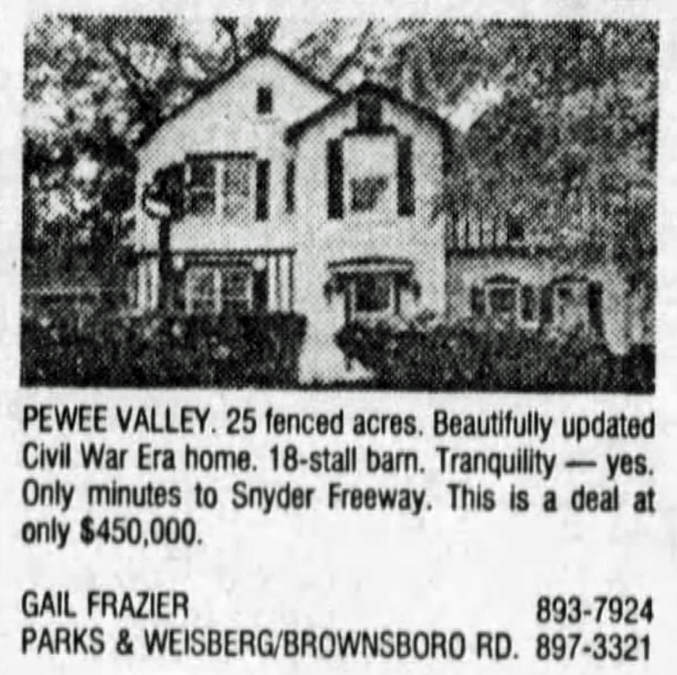Stephen Schuler House
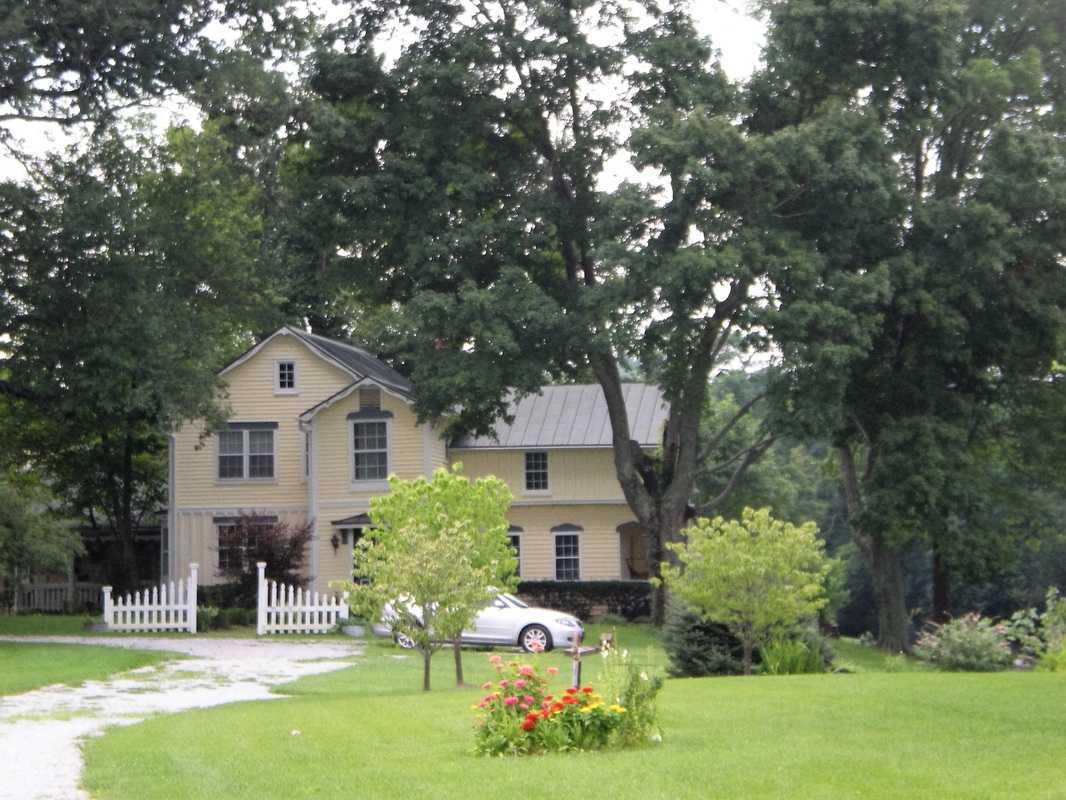
The Schuler house has been remodeled extensively over the past century. The original portion of the house is made of logs and may have been built before 1856 by Murray Phillips. The color photo above was taken June 2016 by Donna Russell. The black and white photos below were taken by Carolyn Brooks in 1989, when Historic Pewee Valley was in the process of creating the city's historic districts.
Located along the old Ballardsville Turnpike-Boonesboro Road (now Rollington Road) at the corner of Houston Lane is the home of landscape architect Stephen Schuler, identified on the 1879 Beers & Lanagan Atlas of Pewee Valley as S. Shuler.
In 1860, the native of Wurtemburg, Germany was living in LaGrange with his Irish wife, Ellen Moloney Schuler; his sister-in-law, Margaret Moloney; his nephew John Moloney; and his three children:
By 1870, the Schulers had arrived in Pewee Valley, according to this classified ad that ran in the March 31, 1870 Courier-Journal:
PRACTICAL LANDSCAPE GARDENING
I will furnish plans and give advice for lay-
ing out the grounds of Rural homes.
S. Schuler
Pewee Valley, Ky.
In 1860, the native of Wurtemburg, Germany was living in LaGrange with his Irish wife, Ellen Moloney Schuler; his sister-in-law, Margaret Moloney; his nephew John Moloney; and his three children:
- Johanna, age 4
- Nannette, age 2
- George, 9 months
By 1870, the Schulers had arrived in Pewee Valley, according to this classified ad that ran in the March 31, 1870 Courier-Journal:
PRACTICAL LANDSCAPE GARDENING
I will furnish plans and give advice for lay-
ing out the grounds of Rural homes.
S. Schuler
Pewee Valley, Ky.
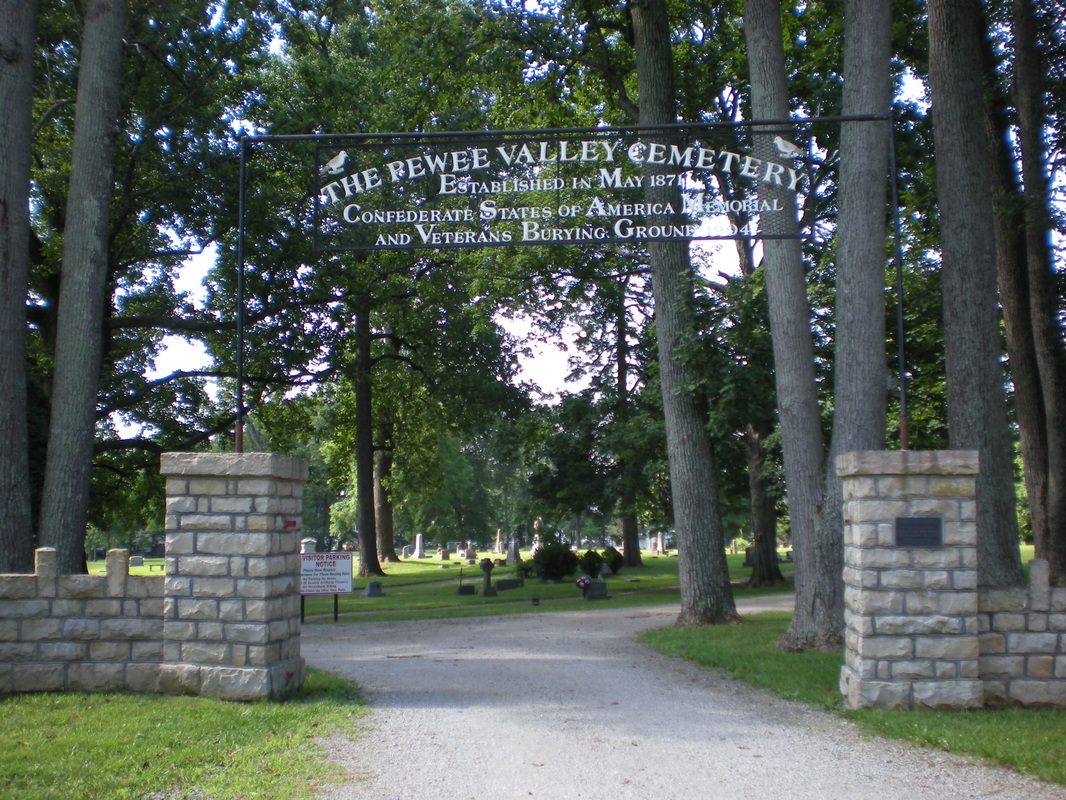 The Pewee Valley Cemetery gates. Stephen Schuler was involved with the cemetery from its inception in 1871 and designed the landscaping in addition to serving many years as Secretary/Treasurer. Photo taken July 19, 2016 by Donna Russell.
The Pewee Valley Cemetery gates. Stephen Schuler was involved with the cemetery from its inception in 1871 and designed the landscaping in addition to serving many years as Secretary/Treasurer. Photo taken July 19, 2016 by Donna Russell.
Within a year, Schuler was actively working on a major town improvement: the establishment of the Pewee Valley Cemetery. According to "Pewee Valley: Land of the Little Colonel" published by Katie S. Smith in 1974:
"In the month of May 1871, Henry Smith, one of the oldest settlers of Pewee Valley (formerly known by the name of Smith's Depot) engaged the attention and enlisted the interest of a number of other prominent citizens of the place in the laudable undertaking of establishing a public cemetery."
"In August the services of S. Schuler as landscape gard, were engaged for making a special topographical design for an ornamental - rural - cemetery - for which said services S. Schuler agreed to accept a certain number of burial plots. During the later part of Winter, 1871, Judge P. B. Muir formulated a charter and had it presented to the Legislature at Frankfort where it passed on the 6th day of May 1872. Henry Smith, J.H. Rhorer and J.C. Stump are its first regul. constituted Directors - Board of."
"In the month of May 1871, Henry Smith, one of the oldest settlers of Pewee Valley (formerly known by the name of Smith's Depot) engaged the attention and enlisted the interest of a number of other prominent citizens of the place in the laudable undertaking of establishing a public cemetery."
"In August the services of S. Schuler as landscape gard, were engaged for making a special topographical design for an ornamental - rural - cemetery - for which said services S. Schuler agreed to accept a certain number of burial plots. During the later part of Winter, 1871, Judge P. B. Muir formulated a charter and had it presented to the Legislature at Frankfort where it passed on the 6th day of May 1872. Henry Smith, J.H. Rhorer and J.C. Stump are its first regul. constituted Directors - Board of."
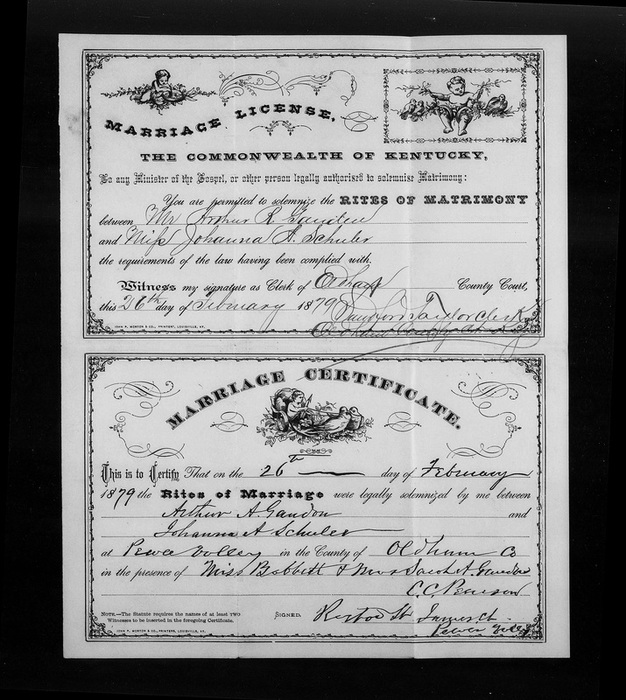 Marriage certificate for Arthur Gauden and Johanna Schuler. The marriage certificate was witnessed by Arthur's mother, Sarah, and a Miss Babbitt, whose parents may have owned the sawmill near Stephen Schuler's house. C.C. Pearson was the minister at St. James Episcopal Church. Courtesy John Northcutt.
Marriage certificate for Arthur Gauden and Johanna Schuler. The marriage certificate was witnessed by Arthur's mother, Sarah, and a Miss Babbitt, whose parents may have owned the sawmill near Stephen Schuler's house. C.C. Pearson was the minister at St. James Episcopal Church. Courtesy John Northcutt.
In addition to working as a landscape architect, Schuler also served as justice of the peace, according to the Kentucky State Gazetteer Business Directory 1883-4.
During the Schulers' years in Pewee Valley, their children grew up. Their oldest daughter, Johanna, married a neighbor in Rollington, shoemaker Arthur R. Gauden, on February 26, 1879.
Gauden's father, William, had at one time owned a store and tavern. He died on February 24, 1857 in Rollington, at the age of 34. His obituary, reprinted in "Annual Obituary Notices of Eminent Persons who Have Died in the United States: For 1857-1858," called him a "worthy and useful citizen...honest and honorable..."
In 1880, the couple was living with Arthur's widowed mother, Sarah, who was a mantua-maker (a French term for dress-maker), and his 86-year-old grandmother, J. Mary Hudson, less than a mile from Johanna's father. In 1884, Arthur was elected to the Pewee Valley Town Council, along with George Metz, Rev. E. Rowley of the Kentucky College for Young Ladies, A.W. Burge, H.C. Sherman, J.W. Calvert and C.J.F. Allen.
During the Schulers' years in Pewee Valley, their children grew up. Their oldest daughter, Johanna, married a neighbor in Rollington, shoemaker Arthur R. Gauden, on February 26, 1879.
Gauden's father, William, had at one time owned a store and tavern. He died on February 24, 1857 in Rollington, at the age of 34. His obituary, reprinted in "Annual Obituary Notices of Eminent Persons who Have Died in the United States: For 1857-1858," called him a "worthy and useful citizen...honest and honorable..."
In 1880, the couple was living with Arthur's widowed mother, Sarah, who was a mantua-maker (a French term for dress-maker), and his 86-year-old grandmother, J. Mary Hudson, less than a mile from Johanna's father. In 1884, Arthur was elected to the Pewee Valley Town Council, along with George Metz, Rev. E. Rowley of the Kentucky College for Young Ladies, A.W. Burge, H.C. Sherman, J.W. Calvert and C.J.F. Allen.
Nannette married Thomas Jefferson Compton on July 18, 1888. In 1880, he was living in the Rollington Road area with his married brother, William, Jr., and clerking at William's store.
|
The Scene of the Crime in Rollington
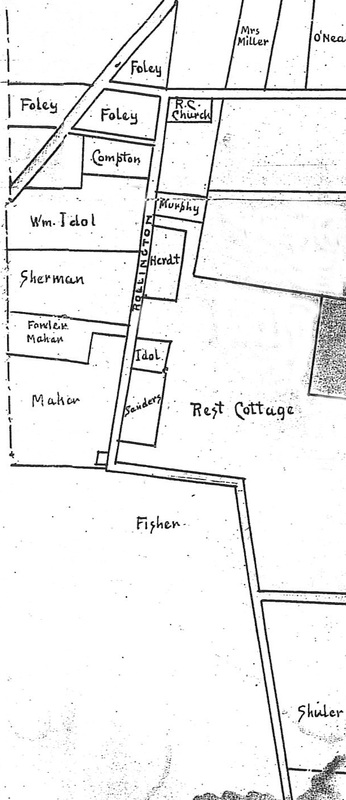
Close-up of Rollington from the 1907 Pewee Valley Map created by Frank Gatchel. The Murphys lived next door to the St. Aloysius Catholic Church and Cemetery. Across the street, at the house marked Compton, was the Gauden home and store. Johanna Gauden's father, Stephen Schuler, lived down Rollington Road just west of Houston Lane.
|
In 1891, Stephen Schuler lost his wife, Ellen, at age 62. On June 16, 1895, he lost his daughter, Johanna, when she was murdered by her husband. The gory details were splashed across the front page of the next day's Courier-Journal:
A BLOODY ----------- TRAGEDY ----------- Arthur Gauden First Shoots Tom Murphy ---------------- THEN BUTCHERS HIS WIFE ---------------------- Used a Shoemakers Knife With Sickening Results ----------------------- CRIME NEAR PEWEE VALLEY _______________ Town Marshall an Eyewitness from the First ________________ GAUDEN TOO QUICK FOR HIM ________________ Murphy Had Been Warned About Gauden's Wife ________________ MURPHY WILL DIE Arthur R. Gauden, a country merchant, killed his wife and mortally wounded Thomas Murphy, at Rollington, thirteen miles from this city, at 5:30 o'clock yesterday afternoon. Rollington is a mile from Pewee Valley. Murphy was shot as he road along the road leading to Pewee Valley (editor's note: Central Avenue), and the woman was butchered with a long-bladed shoemaker's knife. Charles Englehart, the Town Marshal of Rollington, was an eye-witness to the whole of the tragedy. When Gauden walked into his house and butchered his wife into shreds Englehart followed and saw the act completed... ...The woman died instantly. Murphy was alive at a late hour last night, but his attending physician says he cannot possibly recover. He has a bullet in his abdomen. The report that Murphy was intimate with Gauden's wife was common talk about the village, and the husband had heard of it several times. Two years ago Gauden warned Murphy that he would kill him if he did not cease his relations with his wife. Gauden said after the killing that he could stand the disgrace no longer. Gauden had not got along well with his wife for several years. He had a shoe shop at St. Matthews where he lived, though he made a trip home each week. His wife attended to his business while he was away. The shooting occurred in front of Gauden's general merchandise store and shoe-shop. It faces the main street of the little town (editor's note: now Rollington Road), with a wing in the rear on the east side. Gauden had just arrived in Rollington, having walked from St. Matthews. Beside him were standing Chas. Englehart, the Town Marshall, and William Garrett, an old man. Murphy's home was about fifty feet west of Gauden's store, on the other side of the street. About the time Gauden arrived in front of his store and was talking to Englehart and Garrett, Murphy mounted his horse in front of his home, preparatory to riding to Pewee Valley. Gauden was standing between Englehart and Garrett, and all were leaning across a fence which bounds the little side yard. As Murphy was abreast of the three, Gauden pulled from his pocket a 35-caliber Smith & Wesson revolver. He leveled it at the man on horseback and fired three shots in rapid succession. Murphy fell from the horse into the road, and the animal reared back on its hind legs and ran back toward Murphy's house. The horse fell dead about 100 feet from where its master lay. One of the bullets from Gauden's pistol had passed through the horse's body. Eye-witnesses to the shooting say that Englehart did not try to restrain Gauden. As soon as he had fired the shots, Gauden put the revolver in the right hand outside pocket of his coat and walked into the store. He passed through it and into the sitting room in the rear. His wife had been out in the backyard and was attracted toward the road by the sound of the shots. She started to run through the house and met Gauden at the door of the sitting-room. As he heard his wife approaching Gauden picked up a long-bladed shoemaker's knife which lay on his workbench. The woman turned to run the other way as soon as she saw her husband's face, but he reached her at a bound and began slashing her with the knife. |
|
She received more than twenty wounds. Her right hand was almost cut off at the wrist; the same arm was cut twice to the bone at the elbow. The left arm was hacked; she was stabbed three times in the shoulders; a deep cut was made in the left breast; the latter wound probably caused the woman's death. She was also stabbed lower on the left side, where a gash three inches long was made. She was cut on the right side, and two bad gashes were made on her hips. There were three deep stabs on her back. Other parts of her body were covered by smaller cuts. About three inches of the blade of the knife was broken off, and was left in her body. A few seconds before the last stab was given the woman sank to the floor and died.
The woman's clothing was cut into shreds. In the struggle, her feet had been thrown up on the side of the chimney, and her head, hair and shoulders were half immersed in a pool of blood. At the first sight of her husband, Mrs. Gauden had screamed, but after he began to stab her she made no outcry. As soon as his wife was dead Gauden threw down the broken knife and turning to Englehart said: "I want to give myself up." Englehart immediately took charge of the man and marched him from the house. Dr. W.S. Forwood, who lives near by, heard the shots and ran to the house. He hastily examined Mrs. Gauden and pronounced her dead. Then attention was turned to Murphy. He lay in the road where he had fallen from his horse, and at first the crowd thought he was dead. Dr. Forwood found Murphy to be breathing, and a number of men carried him to his house. There Dr. Forwood did all he could for him, but he said to work with the wounded man was hopeless; that he could live but a few hours. About 7 o'clock last night Murphy regained consciousness and could talk. He seemed to realize that he was going to die. He said he had no idea that Gauden was going to shoot. He severely censured Englehart for not interfering, which, as Murphy claimed, the Town Marshal could easily have done. Gauden was taken to Pewee Valley by Marshal Englehart and most of the citizens of Rollington. He did not give up his pistol until he reached Pewee Valley. As he sat on the platform of the depot waiting for the train he asked for a cigar, and when it was handed to him he smoked it cooly. He also bought several cigars to smoke while on his way to Lagrange. |
|
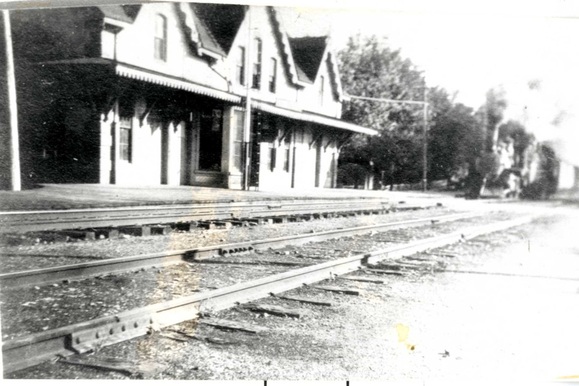 Gauden smoked a cigar on the platform, and bought several more at the station, as he waited for the train to take him to jail. From "History & Families of Oldham County: 1824-1924" published by the Oldham County Historical Society (Turner Publishing, Paducah, Ky., 1996).
Gauden smoked a cigar on the platform, and bought several more at the station, as he waited for the train to take him to jail. From "History & Families of Oldham County: 1824-1924" published by the Oldham County Historical Society (Turner Publishing, Paducah, Ky., 1996).
In speaking of the tragedy Gauden said: "I had not been in Rollington over twenty minutes. I saw a certain woman making signs to my wife and Murphy. She was a go-between for them. I could not stand it any longer. I could not bear for my four little children to be so publicly disgraced. I don't regret it a bit. I only wish my pistol had more bullets in it. There are two others I would have liked to kill at the same time. They were guilty, too. I would willingly kill a thousand such men to save my children from disgrace. I warned Murphy two years ago and he should have kept away from my wife."
Gauden was placed aboard an east-bound freight train on the Louisville and Nashville at 7:30 o'clock last night and Marshal Englehart saw him safely behind the bars of the Oldham County jail. Gauden said he was glad to get away from Rollington. He said he wanted to get as far as possible from the scene of the killing.
Marshal Englehart, in explaining why he did not interfere, says: "Gauden fired so quickly; in fact the whole thing was done so rapidly that I did not have time to lift my hand. When Gauden started into his house I followed as fast as I could, with the intention of arresting him. Before I could reach him, he and his wife were fighting so close together that, had I tried, I would have killed them both. Gauden struck rapidly with his knife. As soon as he quit stabbing her I got hold of him."
Coroner Dowden was summoned soon after the tragedy occurred. He viewed the body of Mrs. Gauden and decided to hold the inquest this morning.
Mrs. Josie Gauden was thirty years of age and very good looking. She was a daughter of Squire Stephen Schuler, a retired farmer of that part of the county. As a girl she was very popular. She was married to Gauden about ten years ago. At first it seemed to be a happy union, but several years afterword the woman claimed her husband treated her badly. About five years ago she left her husband and went to her father's house, but he refused to take her back, and she returned to live with her husband, but they did not live happily together.
Gauden is an Alsatian, about thirty-five years of age, and is a shoemaker. He was a hard worker and thrifty, and soon after his marriage accumulated considerable money. About three years ago he employed young Murphy, who is the son of Patrick Murphy, a butcher living at Rollington, to clerk in his store. Gauden's absence at St. Matthews gave Mrs. Gauden and Murphy an opportunity to be with each other often. Murphy is twenty-two years of age. His connection with Gauden's store was severed about two months ago. Since then he has been working for his father.
In speaking of the tragedy Gauden said: "I had not been in Rollington over twenty minutes. I saw a certain woman making signs to my wife and Murphy. She was a go-between for them. I could not stand it any longer. I could not bear for my four little children to be so publicly disgraced. I don't regret it a bit. I only wish my pistol had more bullets in it. There are two others I would have liked to kill at the same time. They were guilty, too. I would willingly kill a thousand such men to save my children from disgrace. I warned Murphy two years ago and he should have kept away from my wife."
Gauden was placed aboard an east-bound freight train on the Louisville and Nashville at 7:30 o'clock last night and Marshal Englehart saw him safely behind the bars of the Oldham County jail. Gauden said he was glad to get away from Rollington. He said he wanted to get as far as possible from the scene of the killing.
Marshal Englehart, in explaining why he did not interfere, says: "Gauden fired so quickly; in fact the whole thing was done so rapidly that I did not have time to lift my hand. When Gauden started into his house I followed as fast as I could, with the intention of arresting him. Before I could reach him, he and his wife were fighting so close together that, had I tried, I would have killed them both. Gauden struck rapidly with his knife. As soon as he quit stabbing her I got hold of him."
Coroner Dowden was summoned soon after the tragedy occurred. He viewed the body of Mrs. Gauden and decided to hold the inquest this morning.
Mrs. Josie Gauden was thirty years of age and very good looking. She was a daughter of Squire Stephen Schuler, a retired farmer of that part of the county. As a girl she was very popular. She was married to Gauden about ten years ago. At first it seemed to be a happy union, but several years afterword the woman claimed her husband treated her badly. About five years ago she left her husband and went to her father's house, but he refused to take her back, and she returned to live with her husband, but they did not live happily together.
Gauden is an Alsatian, about thirty-five years of age, and is a shoemaker. He was a hard worker and thrifty, and soon after his marriage accumulated considerable money. About three years ago he employed young Murphy, who is the son of Patrick Murphy, a butcher living at Rollington, to clerk in his store. Gauden's absence at St. Matthews gave Mrs. Gauden and Murphy an opportunity to be with each other often. Murphy is twenty-two years of age. His connection with Gauden's store was severed about two months ago. Since then he has been working for his father.
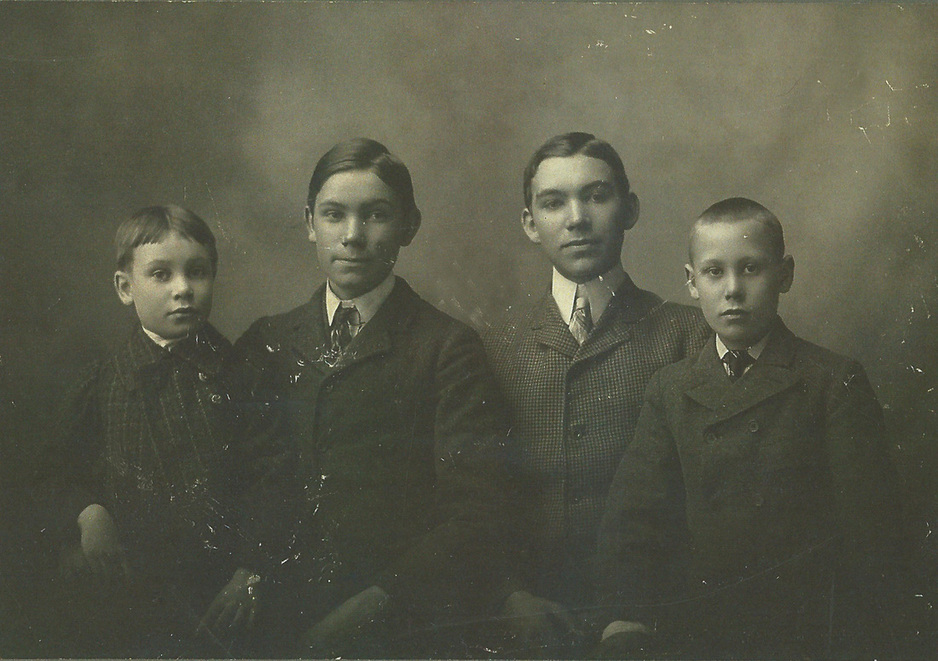 Johanna actually left behind three boys and a girl, left to right, Lilly Anna, Will, George and Walter. Photo taken 1899. Courtesy John Northcutt
Johanna actually left behind three boys and a girl, left to right, Lilly Anna, Will, George and Walter. Photo taken 1899. Courtesy John Northcutt
Squire Schuler, the father of the murdered woman, was prostrated by the shock when he heard of the tragedy, and it was stated last night that it might cause his death. He is a very old man.
Four children were born to Mr. and Mrs. Gauden -- two boys and two girls. The oldest is nine and the youngest two years old.
Four children were born to Mr. and Mrs. Gauden -- two boys and two girls. The oldest is nine and the youngest two years old.
The story drew some national interest and was picked up by the Anaconda Standard in Anaconda, Montana on June 22, 1895:
JESSE WAS TOUGH
--------------------
A CASE SIMILAR TO ONE
OF RECENT DATE
--------------------------
The Injured Husband Kills the Lover
Then Stabs the Erring Wife
Fourteen Times
Louisville, June 21 --Mrs. Jesse Gaudon (sic), a pretty, middle-aged woman who lived near Pewee valley, on the Louisville & Nashville, was stabbed to death tonight, and her companion, Mr. Thomas Murphy, was fatally shot by Arthur Gaudon, the woman's husband. The couple had been separated for several years, and for some time Mrs. Gaudon had been going at a very gay, rapid pace.
Tommy Murphy, a gay young fellow, appeared to be the favorite among her numerous admirers, and this fact was soon observed by Gaudon. He met Murphy and at once drew his revolver and shot him four times in the head and breast. Thinking he had killed Murphy, Goudon went to his wife's house and found her alone. He attacked her with a long dirk-knife, inflicting fourteen wounds on her body and killing her.
She was horribly slashed from head to foot. Gaudon surrendered to the marshal and will have an examining trial to-morrow.
JESSE WAS TOUGH
--------------------
A CASE SIMILAR TO ONE
OF RECENT DATE
--------------------------
The Injured Husband Kills the Lover
Then Stabs the Erring Wife
Fourteen Times
Louisville, June 21 --Mrs. Jesse Gaudon (sic), a pretty, middle-aged woman who lived near Pewee valley, on the Louisville & Nashville, was stabbed to death tonight, and her companion, Mr. Thomas Murphy, was fatally shot by Arthur Gaudon, the woman's husband. The couple had been separated for several years, and for some time Mrs. Gaudon had been going at a very gay, rapid pace.
Tommy Murphy, a gay young fellow, appeared to be the favorite among her numerous admirers, and this fact was soon observed by Gaudon. He met Murphy and at once drew his revolver and shot him four times in the head and breast. Thinking he had killed Murphy, Goudon went to his wife's house and found her alone. He attacked her with a long dirk-knife, inflicting fourteen wounds on her body and killing her.
She was horribly slashed from head to foot. Gaudon surrendered to the marshal and will have an examining trial to-morrow.
What Became of Thomas Murphy
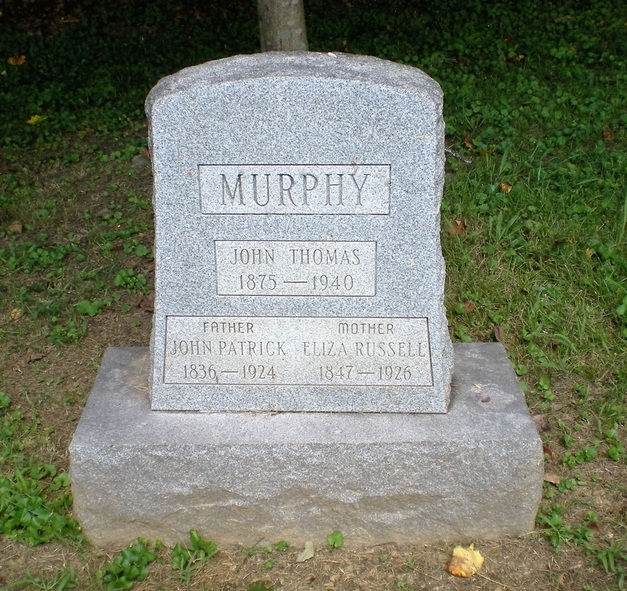
Contrary to Dr. Forwood's expert opinion, Tom Murphy lived to tell the tale of his youthful indiscretion, although whether or not he suffered any permanent disabilities is unknown.
John Thomas Murphy, widower, age 46, was listed in the 1920 census as a teacher living with his elderly parents, J.P. (John Patrick) and Eliza, and his daughter Catherine in the same house on Rollington Road.
By 1930, he was living at 105 Central Avenue (now the site of Central Park) and working as a line stock trader. Living with him were daughters Catherine, 24, who was employed as a cashier in the newspaper office; and Alice, 20, who was a stenographer in an accounting office.
He died at age 65 on July 31, 1940 of colon cancer and is buried with his parents in the Murphy plot at Pewee Valley Cemetery.
John Thomas Murphy, widower, age 46, was listed in the 1920 census as a teacher living with his elderly parents, J.P. (John Patrick) and Eliza, and his daughter Catherine in the same house on Rollington Road.
By 1930, he was living at 105 Central Avenue (now the site of Central Park) and working as a line stock trader. Living with him were daughters Catherine, 24, who was employed as a cashier in the newspaper office; and Alice, 20, who was a stenographer in an accounting office.
He died at age 65 on July 31, 1940 of colon cancer and is buried with his parents in the Murphy plot at Pewee Valley Cemetery.
What Became of Stephen Schuler
The Schuler Family Plot at Pewee Valley Cemetery
Schuler likewise defied his neighbors' predictions and didn't die of shock. He buried his daughter and lived another 18 years, most of it alone at his home on Rollington Road, according to census information. He continued working with the Pewee Valley Cemetery as secretary-treasurer until 1907, when he resigned due to "old age and blindness." At that time, the Short Historical Sketch of the cemetery, which he had written in 1887, and his secretary-treasurer reports were turned over to Charles A. Calvert, the newly-elected secretary of the cemetery and postmaster of Pewee Valley.
Schuler died on February 16, 1913 at age 86. His will, on file at the Oldham County Courthouse in LaGrange, provides some clues about what became of his four grandchildren after Johanna's murder. Thanks to Oldham County Clerk Julie K. Barr for providing a copy to the Pewee Valley Historical Society:
I, Stephen Schuler, of Oldham County, State of Kentucky, being of sound mind and disposition this to be my last will & testament.
A. I direct that my just debts after my demise - together with plain and moderate funeral expenses -- shall be paid out of any "cash on hand & e"
B. That the amount of my Life Insurance Policy in the Coneticut Mutual Life Ins. Co. -No 76.733 in the amt of $2,000.00 shall be paid over to my now living daughter Nanett Compton.
C. To my grand-children by my daughter Johanna-deceased:
I leave each one in due succession -- the sum of $500.00
But be it provided that in this their first distribution, their claims shall not be mature until of the age of 25 years each, and not before 12 months after my death, and also, that these respective claims shall be then paid in the order of their resp. ages. and to each one, as the funds come to hand, to pay the full amount, or if so elected in two yearly payments -- $250.00 first and $260.00 second years (payment) If the claim or claim's of the younger grd-children, could not be settled in this first distribution then let it be duly attended to as noted under S.2 following.
S 2. A. a second distribution may take place at the end of 4 years lease of my property (in March 1915), so that the first claims as noted of the 4 Grd. children, can be satisfied, out of the accruing funds, then becoming due to the estate in cash and notes.
B. After this, and funds being on hand, I herewith direct that at this distribution a sum of $200.00 shall equally be divided and "given" 1/2 to Boy's Orphan Asylum No on Morton Ave -- Louisville, Ky. ---and 1/2 to Young Ladies Episc. Orphans Asyl. No 219 College St.
C. Then -- about March 1917 -- when all indebtedness to the estate has been paid up and collected -- including Bank stock -- if not sold before and all just and lawful claims, expenses and taxes paid let the reminder of the estate be finally and equally be divided among All my 5 grand children, Chas. Compton included.
Schuler died on February 16, 1913 at age 86. His will, on file at the Oldham County Courthouse in LaGrange, provides some clues about what became of his four grandchildren after Johanna's murder. Thanks to Oldham County Clerk Julie K. Barr for providing a copy to the Pewee Valley Historical Society:
I, Stephen Schuler, of Oldham County, State of Kentucky, being of sound mind and disposition this to be my last will & testament.
A. I direct that my just debts after my demise - together with plain and moderate funeral expenses -- shall be paid out of any "cash on hand & e"
B. That the amount of my Life Insurance Policy in the Coneticut Mutual Life Ins. Co. -No 76.733 in the amt of $2,000.00 shall be paid over to my now living daughter Nanett Compton.
C. To my grand-children by my daughter Johanna-deceased:
I leave each one in due succession -- the sum of $500.00
But be it provided that in this their first distribution, their claims shall not be mature until of the age of 25 years each, and not before 12 months after my death, and also, that these respective claims shall be then paid in the order of their resp. ages. and to each one, as the funds come to hand, to pay the full amount, or if so elected in two yearly payments -- $250.00 first and $260.00 second years (payment) If the claim or claim's of the younger grd-children, could not be settled in this first distribution then let it be duly attended to as noted under S.2 following.
S 2. A. a second distribution may take place at the end of 4 years lease of my property (in March 1915), so that the first claims as noted of the 4 Grd. children, can be satisfied, out of the accruing funds, then becoming due to the estate in cash and notes.
B. After this, and funds being on hand, I herewith direct that at this distribution a sum of $200.00 shall equally be divided and "given" 1/2 to Boy's Orphan Asylum No on Morton Ave -- Louisville, Ky. ---and 1/2 to Young Ladies Episc. Orphans Asyl. No 219 College St.
C. Then -- about March 1917 -- when all indebtedness to the estate has been paid up and collected -- including Bank stock -- if not sold before and all just and lawful claims, expenses and taxes paid let the reminder of the estate be finally and equally be divided among All my 5 grand children, Chas. Compton included.
In Addition to the foregoing
It is my wish, that my surviving daughter -- Mrs. Nanett Compton
as my executor-or-administrator without security
Let her have the discretion to divide, give, or sell, the few
household articles and furniture: My Wardrobe is to be hers
The Books &c. also may be by her distributed, given away or sold,
and no inventory will be needed or required.
As to my-Burial-lots-in Pewee Valley Cemetery
let her also use her discretion as above.
Put no flowers on our graves, but a wreath of
Arbor vita and of life ever lasting to entwine the cross.
"Earth-life is short--
A prelude for the life to come;
Where the weary wanderer
Will find his last home -- S.S. in June 1910.
WITNESS my own hand-writing and signature-
this 26th day of Decbr. 1910,
(born 26 " " " 1826)
Stephen Schuler
It is my wish, that my surviving daughter -- Mrs. Nanett Compton
as my executor-or-administrator without security
Let her have the discretion to divide, give, or sell, the few
household articles and furniture: My Wardrobe is to be hers
The Books &c. also may be by her distributed, given away or sold,
and no inventory will be needed or required.
As to my-Burial-lots-in Pewee Valley Cemetery
let her also use her discretion as above.
Put no flowers on our graves, but a wreath of
Arbor vita and of life ever lasting to entwine the cross.
"Earth-life is short--
A prelude for the life to come;
Where the weary wanderer
Will find his last home -- S.S. in June 1910.
WITNESS my own hand-writing and signature-
this 26th day of Decbr. 1910,
(born 26 " " " 1826)
Stephen Schuler
What Became of Arthur Gauden and His Children
|
On November 19, 1895, Arthur Gauden appeared before the Hon. William Carroll, Circuit Judge at the Oldham County Court House in LaGrange. He was indicted by the Grand Jury for murder and malicious shooting. He did not appear with counsel, so three were appointed by the court: J.C. Buckner, C. Harwood Morris and W.A. Wheeler.
The murder trial began on June 16, 1896 and lasted three days. Gauden pleaded, "not guilty of the crime charged in the indictment viz 'willful murder,'" according to the trial records. Witnesses testifying for the defense included many of the Gaudens' neighbors in Rollington. Among them was the Marshal's son, Carl. Marshal Englehart, Tom Murphy, Dr. Forwood, Stephen Schuler and T.J. Compton were among the 20-plus witnesses who testified against him. Garrett Foley was called as a witness by both sides. On June 18, the jury returned their verdict: "We the jury find the defendant guilty and fix his punishment in the penitentiary for eighteen (18) years. N.M. Sanders, Foreman." Gauden was supposed to be tried separately for the malicious shooting charge, but the case was put aside by the State and never brought to trial. On June 20, 1896, he was remanded to the State Penitentiary in Frankfort, Ky. He remained incarcerated there for nine years, until he paroled. Testifying for him at his parole hearing were Esquire G.C. Shadburne, James P. Gregory, Henry Bell, Benson Herr, W.N. Jurey and H.D. Murphy. The January 6, 1905 Courier-Journal reported that Shadburne was accompanied: ... by State Senator H.S. McNutt of Louisville. Judge R.F. Peak, of Shelby County, filed a letter also. He prosecuted Gauden ... |
|
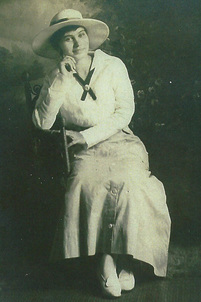 Lilly Anna in 1910, courtesy of John Northcutt
Lilly Anna in 1910, courtesy of John Northcutt
After his parole, he moved to Penial, Fla., where he was reunited with his youngest child, Lilly Anna. He also remarried. His obituary ran in the Friday, May 21, 1915 issue of the Palatka Daily News (Palatka, Fla.):
A. R. Gaudin, for the past eleven years a much esteemed resident of this section, died last Monday. The funeral took place on Tuesday and the interment was in the cemetery at Peniel. Mr. Gaudin is survived by a wife, and three sons, George of Louisville, Ky., William of Fairbanks, Texas, and Walter of Sullivan, Indiana. Mr. Gaudin was a native of Kentucky. Mrs. Squires, the daughter, sends a note to The News in which she desires to thank all who kindly assisted her during the last illness of her father, and for all the tokens of sympathy to the family in their bereavement.
A. R. Gaudin, for the past eleven years a much esteemed resident of this section, died last Monday. The funeral took place on Tuesday and the interment was in the cemetery at Peniel. Mr. Gaudin is survived by a wife, and three sons, George of Louisville, Ky., William of Fairbanks, Texas, and Walter of Sullivan, Indiana. Mr. Gaudin was a native of Kentucky. Mrs. Squires, the daughter, sends a note to The News in which she desires to thank all who kindly assisted her during the last illness of her father, and for all the tokens of sympathy to the family in their bereavement.
What Became of the Comptons
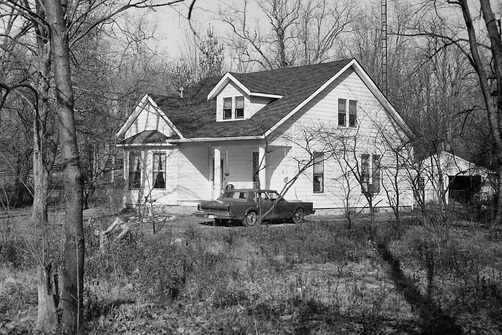 Nanette Compton's bungalow at 111 Central Avenue as it appeared in 1989. Photo by Carolyn Brooks for the Central Avenue Historic District National Register nomination.
Nanette Compton's bungalow at 111 Central Avenue as it appeared in 1989. Photo by Carolyn Brooks for the Central Avenue Historic District National Register nomination.
Around 1898, Arthur Gauden's mother left Pewee Valley and went to live with her sister, Mrs. S.L. Webb, in Penial, Fla. She may have planned to raise her grandchildren there, but shortly after she arrived, she was stricken with paralysis and never recovered. Sarah Gauden died in December 1905. She lived long enough to see her son again after he was paroled.
When she left Kentucky, Sarah sold her home and store on Rollington Road to the Comptons. Census records for 1900 and 1910 show that Nannette and Thomas Compton were living at Sarah Gauden's former home and store after Johanna's death, but did not raise her four children. They had one child living with them -- their own, Charles "C.B." Compton, who later was an officer of the Pewee Valley State Bank. Nannette may have felt unable to take her sister's children, because of the deplorable state of her own marriage. The May 8, 1898 Courier-Journal reported:
Nannie Compton sued for divorce from Thomas Compton, charging him with drunkenness, wasting of estate and cruelty. They were married in July 1888, and have one child. The plaintiff says that recently, because of the defendant's cruelty, she was compelled to leave him. She asks $25 per month alimony, the custody of the child and an injunction preventing the defendant from disposing of the furniture in plaintiff's former home in Pewee Valley.
From Stephen Schuler's will, it seems most likely Johanna's four were sent to orphanages in Louisville, at least for a time.
In 1913, the year her father died, Nannette purchased a lot at 111 Central Avenue near the Pewee Valley Presbyterian Church and built a bungalow. She lived there until 1929, when she moved to Louisville. By that time, she was a widow. She sold the bungalow to Laura Tarleton and carried the mortgage on it for five years. At Ms. Tarleton's death in 1933, she re-purchased it and three years later, sold it to Brent and Irene Million, who operated Million Grocery at what is now the Little Colonel Playhouse. They sold it in 1950, five years before they sold their store to Charles Beard.
The Comptons sold the former Gauden property on December 3, 1921 to J.S. Turner, who had purchased the Garrett Foley residence next door.
Nannette appears to have put the cemetery plots she inherited from her father to good use. She, Thomas, and six other members of the Compton family are buried in Pewee Valley Cemetery:
When she left Kentucky, Sarah sold her home and store on Rollington Road to the Comptons. Census records for 1900 and 1910 show that Nannette and Thomas Compton were living at Sarah Gauden's former home and store after Johanna's death, but did not raise her four children. They had one child living with them -- their own, Charles "C.B." Compton, who later was an officer of the Pewee Valley State Bank. Nannette may have felt unable to take her sister's children, because of the deplorable state of her own marriage. The May 8, 1898 Courier-Journal reported:
Nannie Compton sued for divorce from Thomas Compton, charging him with drunkenness, wasting of estate and cruelty. They were married in July 1888, and have one child. The plaintiff says that recently, because of the defendant's cruelty, she was compelled to leave him. She asks $25 per month alimony, the custody of the child and an injunction preventing the defendant from disposing of the furniture in plaintiff's former home in Pewee Valley.
From Stephen Schuler's will, it seems most likely Johanna's four were sent to orphanages in Louisville, at least for a time.
In 1913, the year her father died, Nannette purchased a lot at 111 Central Avenue near the Pewee Valley Presbyterian Church and built a bungalow. She lived there until 1929, when she moved to Louisville. By that time, she was a widow. She sold the bungalow to Laura Tarleton and carried the mortgage on it for five years. At Ms. Tarleton's death in 1933, she re-purchased it and three years later, sold it to Brent and Irene Million, who operated Million Grocery at what is now the Little Colonel Playhouse. They sold it in 1950, five years before they sold their store to Charles Beard.
The Comptons sold the former Gauden property on December 3, 1921 to J.S. Turner, who had purchased the Garrett Foley residence next door.
Nannette appears to have put the cemetery plots she inherited from her father to good use. She, Thomas, and six other members of the Compton family are buried in Pewee Valley Cemetery:
- Thomas's father, William Compton, Sr. (1807-1856)
- Thomas's mother, Catherine Compton (March 6, 1806-October 12, 1890)
- Thomas's brother, William Compton, Jr. (February 10, 1837-July 12, 1881)
- Thomas's sister, Julia Compton (1839-1925)
- Thomas's brother, Henry H. Compton (1841-1918)
- Ticlah Compton (1851-1942), likely William Compton, Jr.'s wife.
Bentbrook Subdivision
In 1993, the Schuler property was subdivided into Bentbrook subdivision. The first phase fronts Houston Lane and the second, started in 1997, fronts Rollington Road. Stephen Schuler's house and barn remain intact, although the house has been significantly enlarged.
Related Links:

